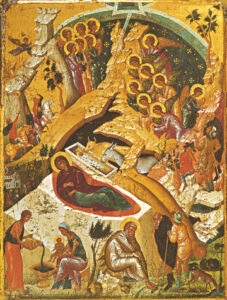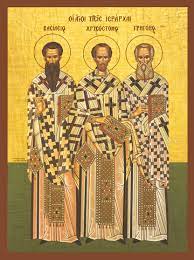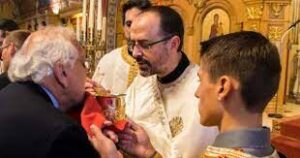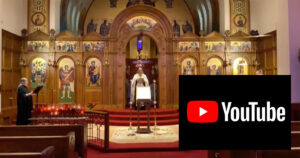Christ is born! Glorify Him!
Today is the Seventh Day of Christmas. Just barely. As I publish this, it’s three minutes before sunset in Milwaukee, and the beginnng of the Eighth Day.
The secular world and even many Christians come to the First Day of the Christmas Feast – and then it’s all over. What a shame. Now that “commercial Christmas” is over, we should be celebrating the Days of Christmas with great joy. Besides, how else do we expect to receive our “seven swans a’swimming” today, let alone “twelve drummers drumming” on the Twelfth Day of Christmas?

Byzantine, 15th century. This certainly tells the whole story! Note upper left:The Magi are arriving on horses, which seems to be the earliest tradition.
(icons by permission of Saint Isaac’s Skete at skete.com)
Also, yes, we all know that Orthodox Ecclesiastical New Year is September 1 – but let’s go with January 1 for now.
Our New Year’s Resolutions
Of our four New Year’s resolutions listed in the heading, prayer is absolutely the most important, and we’ll talk about that next week. However, at this point in history I believe that we especially need to concentrate on thinking – especially about Covid-19, about which people are still fighting like cats and dogs, to the detriment of all. I trust you will continue to pray till next Friday.
Think
A Brief Theological Introduction
There are some today who seem to think thinking (!) and reason and science are incompatible with Christianity. Well, that belief is certainly incompatible with Christianity!
 Christ our God is Himself ο λόγος, the Logos, the divine “Word, Speech, Reason” Who orders the universe. We think and reason because God created us in His image, and therefore gave us minds. Logic and reason and scientific exploration and analysis tell us many things about our Creator, just as a painting tells us much about what the artist is like.
Christ our God is Himself ο λόγος, the Logos, the divine “Word, Speech, Reason” Who orders the universe. We think and reason because God created us in His image, and therefore gave us minds. Logic and reason and scientific exploration and analysis tell us many things about our Creator, just as a painting tells us much about what the artist is like.
Certainly we did not think God into existence. He thinks us into existence. And Christ is God’s ultimate revelation of Himself.
However, how to “handle” that revelation has always required much thought and reason. The Evangelists had to think carefully about what information about Christ to include in the Gospels, and which stories not to tell. John 21:25 Saint Paul obviously put much reasoning into his Epistles.
 The Church Fathers were grounded in philosophy and logic, not only in the Holy Scriptures. By thinking deeply in that light, they gave us their profound understanding of God, of Jesus Christ, of the correct interpretation and meaning of the Scriptures, upon which we rely to this day: the Creed, the doctrines of the Holy Trinity, the Incarnation, the Church, the Holy Eucharist, the basics of Christian morality, and much more.
The Church Fathers were grounded in philosophy and logic, not only in the Holy Scriptures. By thinking deeply in that light, they gave us their profound understanding of God, of Jesus Christ, of the correct interpretation and meaning of the Scriptures, upon which we rely to this day: the Creed, the doctrines of the Holy Trinity, the Incarnation, the Church, the Holy Eucharist, the basics of Christian morality, and much more.
The Three Hierarchs
Everything in life requires reasoning. We think before we cross a street, about how to raise our children, before we choose our clothes in the morning, about whether or not it’s wise to shoplift.
In all matters we also turn to the wisdom of others who have studied and researched and thought more deeply than we, and therefore we trust them to to inform and guide us.
Farmers turn to meteorological science and the weather forecast before planting a crop. Before we purchase a refrigerator we go online and find reviews, to make sure we’re not buying junk. We learned to pay heed to studies that show smoking often results in lung cancer. When we’re ill, we turn to physicians who have studied for many years, and who know how to apply the healing properties that God has built into nature.
Am I running this into the ground? All the above seems so “reasonable” that it shouldn’t need to be said – except that it does. People today seem to believe so many unreasonable things.
Let’s try to apply reason and thought to this subject which is still sadly so close at hand.
The Covid Pandemic
In the first part of what follows I am going to try to help us ask the right questions.
Ask: From where are you getting your information about Covid? Is it from media personalities? talk show hosts? politicians? sports heroes? people on Facebook? Twitter? Do you know where they are getting their information? (Personally, sometimes I wonder where in the world – literally- some of this stuff is coming from. And why.)
Are you turning to the conclusions of the vast majority of competent medical authorities in the world?
Have you researched it for yourself? This  is not hard.
is not hard.
For example, you could go to the Mayo Clinic site, which provides much information: https://www.mayoclinic.org/diseases-conditions/coronavirus/in-depth/coronavirus-vaccine/art-20484859
Or you might turn to Johns Hopkins University: https://coronavirus.jhu.edu
Some of my following questions presume the answers:
Do you turn to reputable news sources for information about the Pandemic? Are you aware how American hospitals are again filling beyond capacity with Covid patients (now including children), the vast majority of whom are people who have not been vaccinated? How hospital staffs are burning out again, and other patients who need care are being turned away again, and how this is costing American society (all of us) a vast amount of money again? – most of which seems entirely unnecessary.
Brothers and sisters, should we seek the facts only because we care for our own personal survival? Or do we also see our moral obligation to try not to infect others? Even if we have been vaccinated and feel safe ourselves, do we consider the people around us who may not know that? Would our distancing and wearing a mask keep them from worrying and being afraid? How hard is that? “Love your neighbor as yourself.”
Regarding Covid in church
Here, too, please ask questions, think, use reason and turn to trustworthy authorities. Most important, turn to the Church’s Tradition and theology. This time I’ll try to provide some answers, to the best of my knowledge. If I am in error, please comment below. I want to be accurate about this.
Q. Is it true that when we are at church we are protected from catching disease?
Q. Is this belief found anywhere in the Church’s Tradition?
A. Not to my knowledge.
Q. Is it found in the Holy Scriptures?
A. No.
Q. Do any lesser later “traditions” speak to it?
A. I don’t think so.
Q. Do individual Orthodox have the right to hold this as a personal opinion?
A. Yes.
Q. However if your personal opinion, based on your God-given reason and made in conscience, is that during the Pandemic it is unwise for you to attend church, are you therefore “weak in faith”?
A. No, you are not. And don’t let anybody tell you you are.
Q. Is it true that one cannot catch disease through receiving the Holy Eucharist?
Q. Is this belief found anywhere in the Church’s ancient Tradition?
A. I don’t know.
Q. Do any contemporary hierarchs teach this?
A. Yes, and some others certainly imply it by their actions. Others are more cautious.
Let’s ask some theological questions:
Some speculations: 1 If I understand Orthodox teaching correctly, we believe that when the bread and wine become the Body and Blood of Christ; there is no chemical change; they also still remain material bread and wine. Does that have any implications? Do we believe then that every time we receive Communion, the Lord works a sort of miracle by which disease cannot be contracted through the bread and wine?
2 We believe that the Church (that is, the People of God) is the Body of Christ. In fact, I read that when Orthodox think of the Body of Christ, they usually think first of the Church and then secondarily of the Holy Eucharist. So do we therefore also believe that we cannot catch a disease from members of the Church?
3 Some say that it’s the alcohol in the wine that prevents the transmissin of disease. Is this true?
Here’s my personal experience: When I was pastor and was contagious but nevertheless needed to preside at Divine Liturgy, out of consideration for my people I did not receive Holy Communion till after everyone else had. But then afterwards I had to consume the Holy Gifts and cleanse the Chalice – and I’m sure I had no more sickness than anyone else. So my opinion, based on years of experience, is that the Holy Eucharist somehow does not transmit disease. But that is only my personal opinion.
 courtesy of Pravmir
courtesy of Pravmir
Q. Does this belief about the Eucharist also apply to the Communion Spoon?
A. Good question.
Q. Why do Orthodox receive Holy Communion from a shared Spoon?
A. No one knows. During the first thousand years of Church history, Orthodox received the Bread and Wine separately.
Q. In order to alleviate peoples’ worries during the Pandemic, could our hierarchs have found a way to return to that more ancient Tradition? – only for the duration.
A. I wish! A few have tried – using multiple spoons, for one example.
Here are a couple of interesting (and I think, reputable) articles on the subject:
https://www.ncbi.nlm.nih.gov/pmc/articles/PMC7377019/
https://www.rferl.org/a/coronavirus-vs-the-church-orthodox-traditionalists-stand-behind-the-holy-spoon/30492749.html
Finally, this has been my personal practice during the Pandemic: I am old and have a long-term disease, the cause of which is unknown, which means I am especially susceptible. Covid-19 is especially contagious. Therefore, after much thought and prayer, during the Pandemic I have received the Eucharist only when I am confident the priest himself has taken proper precautions regarding the Covid, and only when very few others receive.
Q. Does this indicate a lack of faith on my part?
A. I hope not. I am trying in faith to use the reason God gave me.
Q. Is it true that it is impossible to actually worship Live-stream?
A. No. That is not true. I speak from experience.
Of course it’s not the same as being in church. Orthodox are “people who need people”. We need to worship with others and receive the Holy Eucharist together.
However, during this second outbreak of the Pandemic, Khouria Dianna and I are again worshiping Live-stream. We would feel safe at church if all were vaccinated and distanced and wore masks. However…
 Holy Trinity Greek Orthodox Cathedral, Portland, Oregon
Holy Trinity Greek Orthodox Cathedral, Portland, Oregon
We watch on our large television screen, so it feels like we’re in the balcony. We burn incense. We pay close attention. We stand and cross ourselves and even sing along as appropriate. We listen carefully to the readings and the homily.
When it is time for Holy Communion, we say the appropriate pre- and post-Communion prayers, and I ask my Lord Jesus to come to me, into my heart and mind and soul and give me His strength and wisdom. Under the circumstances I do not believe He denies me that.
We worship God Live-stream.
Q. Can this be used as an excuse to avoid going to church?
A. Yes.
Q. Am I using this as an excuse to avoid church?
A. No way! I can hardly wait to get back to church and worship with my brothers and sisters and receive the Holy Eucharist again. Meanwhile, thank God for live-stream Liturgy. It keeps me in touch with Reality.
I have thought and prayed and searched, and in good conscience came to my own conclusions about these matters.
As for you, do not just “go with the flow” (whichever flow you happen to be in). Please pray and think and search and decide what you should do, in good conscience before God. And then do not let anyone try to make you feel guilty about it.
Think.
Next Week: the rest of our New Year’s Resolutions. (It’s never too late.) Pray, Shape up, Be kind.
Week after next: The other great Saint Gregory
Fr. Bill, Many blessings to you and Khouria Dianna, and your family for the New Year, and may our precious Lord, through the prayers of St. Basil the Great, whose memory we commemorate today, grant you Many Years! Happy Name Day. As always, thank you for your messages. Be well in our Lord.
Fr. Constantine
Thank you and God bless you, Father Constantine.
Great content! Keep up the good work!
Thank you. I appreciate the encouragement.
FB
I thank you, Father that you convey your thoughts and wisdom through this blog….I read your posts every week and enjoy your insights and comments. It was truly a sad day when our church closed for a couple of months during the pandemic….I remember the first time I watched the Liturgy on my cell phone on FB, since we did not previously have online services (but of course we’ve come a long way since then, as has most everyone).
I thank you for encouraging everyone to obtain their information from reliable sources.
Thank you, NMH, for the encouragement. I feared that writing as plainly as I did in my last two Posts might upset some readers, and perhaps it did. However, in my conscience I felt I needed to do it.
FB